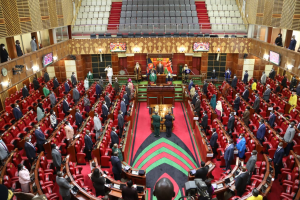President Uhuru Kenyatta officially opens Pakistan-Africa Trade and Development Conference, at KICC Nairobi / PSCU
NAIROBI Kenya Feb 28- Kenya is set to be a key driver in global trade growth, with its exports projected to grow at an average annual rate of more than 7 percent to cross USD10.2 billion by 2030.
According to new research by Standard Chartered dubbed the Future of Trade 2030: Trends and markets to watch, Pakistan will be the fastest-growing export corridor for Kenya, set to grow at an average annual rate of 10.7 percent.
Kenya and Pakistan already have historical trade ties in tea and rice, with Pakistan being the largest buyer of Kenyan tea.
The two countries are working to diversify bilateral trade, focusing on pharmaceuticals, leather, flowers, tourism, machinery for agriculture, and construction materials.
As per the report, Uganda and the USA will continue to be the leading export corridors for Kenya, accounting for 11 percent and 9 percent of total exports in 2030, respectively.
The report, commissioned by Standard Chartered and prepared by PwC, is based on an analysis of historical trade data and projections until 2030, as well as insights from a survey of more than 500 C-suite and senior leaders in global companies.
Kenya is investing to expand its manufacturing sector and is strengthening its regional trade relations. Moreover, Agriculture & Food, Metals & Minerals, as well as Textile & Apparel, are key sectors which will dominate exports in the 10 years to 2030.
According to the study, five key trends will shape global trade including the wider adoption of sustainable and fair-trade practices, a push for more inclusive participation, greater risk diversification, more digitisation and a rebalancing towards high-growth emerging markets.
Last year, Kenyan exports recovered to post an 11.7 percent growth to Sh765.2 billion ($6.739 billion), provisional data by the Central Bank of Kenya (CBK) reveals.
According to the CBK data, the exports rose from Sh685 billion ($6.033 billion) in 2020 as the economy re-emerged from the initial impact of the COVID-19 crisis.
Most of the exports by broad economic category recorded a double-digit rate of growth in the calendar year with manufactured goods posting the highest jump at 33.4 percent.
As a result of the higher imports, Kenya’s current account deficit (CAD) has jumped to 5.4 percent of GDP from an estimated 5.2 percent but remains within CBK’s target.
“This points to stability and a well-behaved forex exchange market supporting what has happened so far,” CBK Governor Patrick Njoroge said in January.
Almost 90 percent of the corporate leaders surveyed agreed that these trends will shape the future of trade and will form part of their five to 10-year cross-border expansion strategies.
“Asia, Africa and the Middle East will see a ramp-up in investment flows, with 82 percent of respondents saying they are considering new production locations in these regions in the next five to 10 years, supporting the trend towards rebalancing to emerging markets and greater risk diversification of supply chains,” the report stated.
The research found a significant trend towards the adoption of sustainable trade practices in response to climate concerns and a rising wave of conscious consumerism.
However, while almost 90 percent of corporate leaders acknowledged the need to implement these practices across their supply chains, only 34 percent ranked it as a ‘top three’ priority for execution over the next five to 10 years.
“The predicted doubling of global trade offers strong evidence that globalisation is still working, despite recent dislocation. In addition to the growth of intra-regional trade pathways, the corridors of the future will still cut across continents,” Head Transaction Banking Standard Chartered Makabelo Malumane said.


















